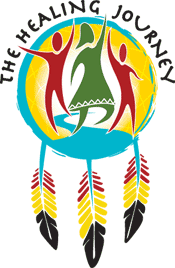Roots of Violence
To address family violence, we must understand its root causes, recognize the interconnections among the various forms of violence, and look for holistic remedies. Clearly, Aboriginal people, as well as non-Aboriginal people who provide services and resources, cannot respond to today’s challenges without understanding the past and revisioning the future. |
 |
To address family violence, we must understand its root causes, recognize the interconnections among the various forms of violence, and look for holistic remedies. Clearly, Aboriginal people, as well as non-Aboriginal people who provide services and resources, cannot respond to today’s challenges without understanding the past and revisioning the future.
What are some of the historical factors that have contributed to the roots of violenceÀ
There are many historical factors that have hurt Aboriginal communities, including:
• Colonialization
• Racism
• Isolation
• Residential schools
These have all resulted in profound harm to Aboriginal communities including loss of language and culture, alienation, poverty, unemployment, and an erosion of traditional knowledge, values and skills, including parenting skills. For example, Aboriginal children who were forced to attend residential schools were systematically denied the value and benefit of their families, culture, and language.
Aboriginal communities have been dealing with the impact of these historical factors for many decades. The relentless impact of such systemic barriers has given rise to other problems and negative conditions in Aboriginal communities, which in turn have resulted in high rates of
• Substance abuse
• Suicide
• Teen pregnancy
• School drop out and low literacy
• Incarceration
• Low self-esteem
• Health problems and despair
These conditions have also contributed to
• High rates of violence in interpersonal relationships
• High rates of child abuse and neglect
• High rates of family violence, particularly woman abuse.
As a result, some of the current challenges that Aboriginal communities face include:
• Fostering personal, family and community healing
• Eliminating poverty
• Promoting economic development
• Ensuring adequate housing and transportation
• Enhancing education
• Improving employment opportunities
• Preserving culture and language
• Fostering traditions and spirituality.
|
|
First Nation and Inuit women in particular experience higher rates of family violence than non-Aboriginal women. In 2004, research showed that Aboriginal women were three and half times more likely to suffer some form of spousal violence than non-Aboriginal women .(Statistics Canada, Juristat,Catalogue No. 85-002-XIE, Vol. 26, no. 3) |
|
|
Of the Aboriginal women who have experienced family violence, 87% were victims of physical abuse and 57% were sexually assaulted. (Health Canada) |
|
|
21% of Aboriginal people reported that a current or ex-spouse had assaulted them in the past five years, compared to 6% of the non-Aboriginal population (Statistics Canada, Juristat,Catalogue No. 85-002-XIE, Vol. 26, no. 3) |
|
|
Almost 1/2 of Aboriginal victims of spousal violence experienced potentially life-threatening violence at the hands of a current or ex-partner compared with 31% of non-Aboriginal victims of spousal violence. (National Aboriginal Circle Against Family Violence) |
•
The National Aboriginal Circle Against Family Violence
NACAFV as an organization has its basis in a consultative process that respects and recognizes Aboriginal knowledge as necessary for the effective provision of family violence intervention and prevention to Aboriginal peoples. The objective of NACAFV is to serve many stakeholders by acting as a national clearinghouse for on-the-ground information, develop standards, training programs and provide project monitoring around Aboriginal family violence.
NACAFV
396 Cooper Street, Suite 301
Ottawa, ON K2P 2H7
Tel: (613) 236-1844
Fax: (613) 236-8057
• Aboriginal Healing Foundation
Their mission is to encourage and support Aboriginal people in building and reinforcing sustainable healing processes that address the legacy of Physical Abuse and Sexual Abuse in the Residential School system, including intergenerational impacts. They have several publications, including their own research series, which examine the impact of residential schools on Aboriginal individuals, families and communities.
Aboriginal Healing Foundation
75 Albert Street, Suite 801
Ottawa, ON K1P 5E7
Tel: (613) 237-4441
Fax: (613) 237-4442
Toll Free: (888) 725-8886
A paper written by Michael Bopp, Judie Bopp and Phil Lane – from the Aboriginal Healing Foundation’s Research series (see above).
Written by W.J. (Bill) Mussell – from the Aboriginal Healing Foundation’s Research series (see above).
Written by David McTimoney for Health Canada and Indian and Northern Affairs Canada, and available from the National Clearinghouse on Family Violence.
This web site attempts to give voice to the untold stories of so many Aboriginal boys and girls who attended residential schools in Canada from 1831 to the 1990's. By doing so, the objective is to bring healing to those whose experiences have left them behind, as well as begin to introduce a sense of understanding for all Aboriginal and non-Aboriginal peoples.
The Legacy of Hope Foundation
75 Albert Street, Suite 801
Ottawa, ON K1P 5E7
Tel: (613) 237-4806
Fax: (613) 237-4442
Toll Free: (888) 725-8886
The Native Women’s Association of Canada (NWAC) launched the national Sisters in Spirit Campaign in March 2004 to raise public awareness of the alarmingly high rates of violence against Aboriginal women in Canada. NWAC believes we are in an urgent state of affairs with regards to the safety of Aboriginal women in Canada.
Native Women’s Association of Canada (NWAC)
1292 Wellington Street W
Ottawa, ON K1Y 3A9
Tel: (613) 722-3033
Toll Free: (800) 461-4043
A web site looking at the history and nature of institutional child abuse. It shows how survivors are naming the abuse and restoring dignity in their lives and communities. For the purpose of this web site, institutional child abuse means the abuse forced upon a child living in an institution in Canada. The web site offers includes many resources related to the legacy and impacts of the residential school system.